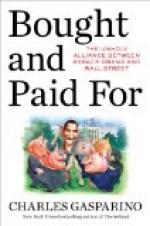Yet Fred might be right, after all. He had himself known men, confirmed bachelors like himself, who had got married and regretted it ever since. Their lives had become a burden to them. They were outrageously henpecked, made to dance attendance until all hours of the morning upon silly, bridge-loving wives. True, but they were poor, weak-minded simpletons, just the kind of men to be dominated, bullied by a woman. He would like to see the girl who could coerce him into doing anything he did not wish to do. If he ever married, he would rule his own household; no woman would venture to dictate to him. He would insist on his absolute independence, do as he chose, go where he liked. He would be the master. If the husband had not the right to command, who had? When a pair of horses was sold, did they not belong to the purchaser? A wife was, in a sense, a purchase. The average society girl who gets married nowadays practically sells herself. She wants a man with money—a man who will give her jewels and clothes and an establishment that will make every other girl of her acquaintance green with envy. She gets him—for a consideration. That, no doubt, was the kind of girl he would one day get. She would offer herself, and if he liked the look of her he would buy her, and, having bought her, she would learn soon enough that there was only one master in the Stafford household. It was not necessary that they love each other. They would be good friends, chums, and all that, but he would never let go of the check-rein. Certainly he would always be the master.
He was thus engrossed in his reflections, when there came a gentle rap at the door. Instantly galvanized into action, he called out in stentorian tones:
“Come in!”
The door was pushed open, and Virginia Blaine entered, notebook in hand. Her face was slightly flushed, and she stood hesitatingly on the threshold, as if fearing to enter. She was attired in deep mourning, and the simple black dress, relieved only by a little white lace collar round the neck, enhanced the natural rich coloring of her face. Starting hastily from his seat, Stafford advanced towards her. Timidly she said:
“You asked for a stenographer?”
Impressed, as well as surprised by her beauty, at a loss for a moment what to say, the railroad promoter stammered confusedly:
“No—that is—yes—by all means—won’t you sit down?”
She took a seat near the desk, and opening her notebook, got ready to take dictation. Stafford looked fixedly at her. He remembered now having seen her at the telephone switchboard downstairs in the hotel lobby. Smilingly he said:
“What is your name?”
“Miss Blaine,” she replied coldly.
“We’ve met before, haven’t we?” he went on.
She colored under his close scrutiny. Why did he stare so? It made her very uncomfortable. If he did not cease looking at her, she would close her book and walk out. It was much against her will that she had come up, alone, to a man’s apartment. But she could not afford to lose an opportunity of earning a little extra money. Answering his question, she said rather curtly:




